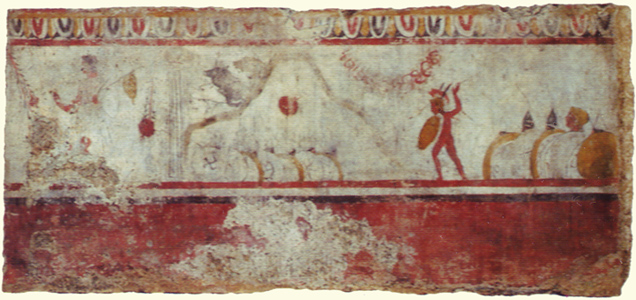Battle of the Caudine Forks
| Battle of Caudine Forks | |||||||
|---|---|---|---|---|---|---|---|
| Part of the Second Samnite War | |||||||
| |||||||
| Belligerents | |||||||
| Roman Republic | Samnium | ||||||
| Commanders and leaders | |||||||
|
Titus Veturius Calvinus Spurius Postumius Albinus | Gaius Pontius | ||||||
| Strength | |||||||
| Unknown | Unknown | ||||||
| Casualties and losses | |||||||
| Insignificant | Insignificant | ||||||
The Battle of Caudine Forks, 321 BC, was a decisive battle of the Samnite Wars.
The Trap

The Samnite commander, Gaius Pontius, hearing that the Roman army was located near Calatia, sent soldiers disguised as shepherds with orders to give the same story which was that the Samnites were besieging Lucera in Apulia. The Roman commanders, completely taken in by this ruse, decided to set off to give aid to Luceria. Worse, they chose the quicker route though the Caudine Forks. The area round the Caudine Forks was surrounded by mountains and could be entered only by two defiles. The Romans entered by one but when they reached the second defile, they found it barricaded. They returned at once to the first defile only to find it now securely held by the Samnites. At this point the Romans, according to Livy, fell into total despair knowing the situation was quite hopeless.
The Samnites' dilemma
According to Livy, the Samnites had no idea what to do to take advantage of their success. Hence Pontius was persuaded to send a letter to his father, Herennius. The reply came back that the Romans should be sent on their way, unharmed, as quickly as possible. This advice was rejected and a further letter was sent to Herennius. This time the advice was to kill the Romans down to the last man.
Not knowing what to make of such contradictory advice the Samnites then asked Herennius to come in person to explain. When Herennius arrived he explained that were they to set the Romans free without harm, they would gain the Roman's friendship. If they killed the entire Roman army then Rome would be so weakened that they would not pose a threat for many generations. At this his son asked was there not a middle way. Herennius insisted that any middle way would be utter folly and leave the Romans smarting for revenge without weakening them.
The Aftermath
According to Livy, Pontius was unwilling to take the advice of his father and insisted that the Romans surrender and pass under a yoke. This was agreed to by the two commanding consuls, as the army was facing starvation. Livy describes in detail the humiliation of the Romans, which serves to underline the wisdom of Herennius's advice. However it is now accepted that, far from the Senate rejecting the agreement made by the consuls (as stated by Livy), Rome kept to the terms for several years until 316 BC.
However, Livy's account remains, even if only as a parable, a powerful illustration that the middle course is not always the best. For example Erich Eyck in "A History of the Weimar Republic" uses this example to emphasize the folly of the Entente powers: having defeated Germany in the First World War they humiliated her and thus opened the way to the rise to power of Hitler but without significantly weakening her, so that Germany under Hitler was a threat.
